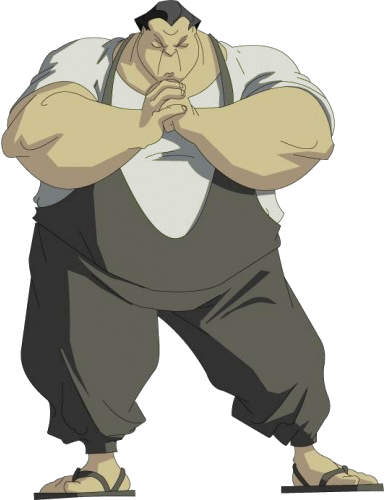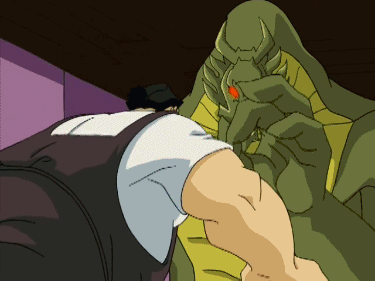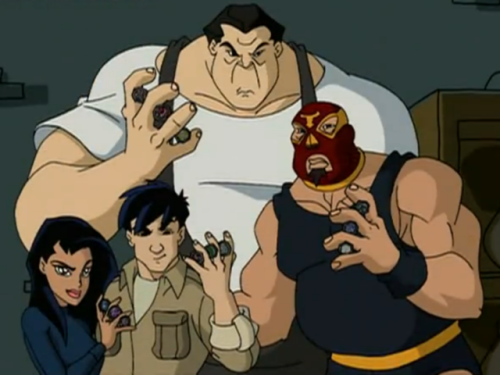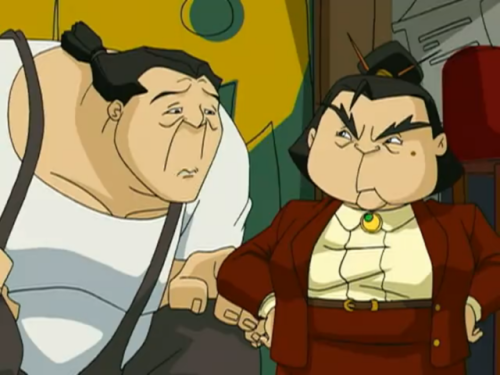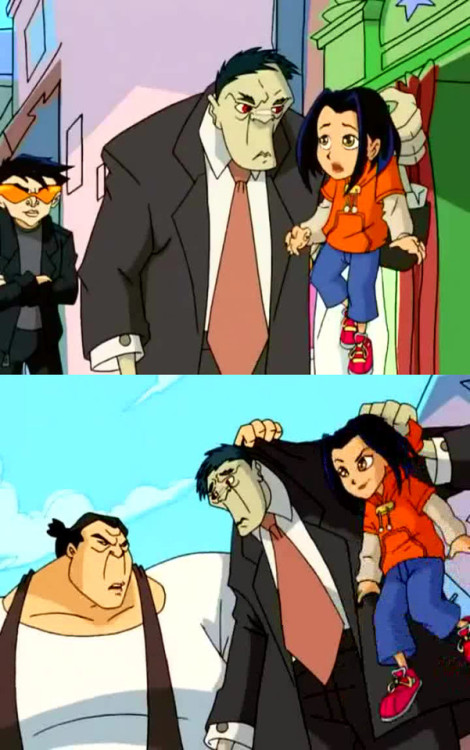ninetyfivepercentdantomasik: Great Characters: Tohru (Jackie Chan Adventures) Everyone has their fav
ninetyfivepercentdantomasik:Great Characters: Tohru (Jackie Chan Adventures)Everyone has their favorite character types. The Lone Gunslinger, the Wandering Samurai, the Wacky Sidekick, the Wise Mentor, the Maniacal Villain, and on & on. One of my favorite character types is an unusual one, “Developed Henchmen”. Characters who begin as dumb muscle but develop into fully rounded individuals. That love originated from one character from the animated series Jackie Chan Adventures, Tohru.Tohru began as what you’d call “the big thug”. Literally, he’s about 8ft tall and 6ft wide of equal parts bulk and muscle, working for a criminal enterprise as their enforcer. He is who Valmont calls when he wants things done. He is shown in the opening theme as the first Huge Threat for Jackie to take down in a single (albeit painful) punch. His role in any episode is to do what Valmont’s other, less reliable henchmen can not; get results. Dirty work, heavy work, and generally Big Work. Tohru is not a talker. The majority of his lines in the first season are less than four words.“The shield.”“The talisman.”“The pig.”“What?”“Chan.”“I hate fish.”“Mmm. Peppy.”That said, the main motif for Tohru’s character is to, somewhat humorously, add weight (both figuratively and literally) to any situation. And it works. For having the losing record he does against the Chans, he is never seen as a threat to be taken lightly. Tohru’s involvement always means things just got a whole lot harder. Be it a fight, a chase, or a pie-eating contest.Following the end of the first season, where Tohru is ordered by Valmont to fight a Demon Sorcerer and is finger-flicked across a room, through a set of doors, down a hallway, into an elevator shaft, out of an elevator shaft, out of a skyscraper and into a neighboring skyscraper, Tohru begins to question his choice of employment. In his first act towards repairing the damage he’s helped cause, he gives Uncle the information needed to address this new threat.“The demon’s name is Shendu.”There’s no interrogation, no trickery, and no obligation demanded in exchange for the Chans treating his wounds, it’s Tohru’s own decision to help. And with that one single action, Tohru starts a new life with the Chans.It is in many ways like his old life. He is still often used for his size and strength against magical and non-magical threats. However, in a surprising turn, Tohru also begins learning Chi Magic from Uncle. As the series progresses, the amount of time he spends fighting decreases, while the amount of time he spends doing research, learning spells, performing rituals, working in the shop, and engaging in casual conversation increases dramatically. Some of it is used for comic effect. It adds a strange and humorous tension to see a giant man holding a small pufferfish between his fingers speaking magic words rapidly. The fourth season brings Tohru even further into the forefront as he, being of Japanese heritage, must be the one to create the spells, rituals, and potions needed to combat the Oni Generals and their tribes of Shadowkhan, not Uncle. He succeeds, and while Tohru may never be seen as the formidable magic expert Uncle is, he ends the series as the one who deduces the method of banishing the demon threat once and for all. Tohru’s last scene is receiving the title and rank of “Chi Wizard” by Uncle. It’s an incredibly proud last note for a character who began as just a Big Thug.Between that start and end, Tohru remains a prominent character in the series, appearing in more than ¾ of the episodes. Again, somewhat humorously, he never has a small part in an episode. The character has such a presence that even the smallest acts make a big impact. Not just fighting, but listening to Jade talk about her problems, helping Jackie look after Jade, helping Uncle with the shop, etc. Each of the Chans come to see Tohru as more than just size & strength. Uncle sees motivation to learn and respect for one’s elders, two traits in short supply around the shop. Jackie sees responsibility and humility, traits he wishes to teach Jade. Jade sees someone who knows what it feels like to be invisible to other people. As for the nature of the show itself, if someone can knock Tohru aside, that’s all the proof we need for a higher level of “Bad Day”.He builds a relationship with Jade that’s particularly powerful. Jade, who loves her uncle Jackie and can always think of ways Tohru can help, pushes him to get involved and help keep everyone safe. Tohru, knowing what Jade means to Jackie as well as what it means to have no one listen to you, is always there for her, looks out for her, believes in her, and tries to be the good guy she thinks he can be. In such a short time, Tohru has become protective enough of Jade that he at one point threatens to turn his former master Valmont inside-out if anything should happen to her. This culminates in one of Tohru’s greatest moments in the J-Team’s first official mission to a Shady Martial Arts Tournament, which goes very, very, poorly. The tournament is such unfamiliar territory for the group that each member ends up a combination of defeated, crippled, or knocked out. This leaves Tohru as their last chance of gaining access to the inner workings of the operation, in a fighting format he insists he is, of all things, “too small” for, Sumo. Jade does everything she can to teach and encourage Tohru, believing he will do great. The show does a spectacular job of showing just how debilitating Tohru’s reluctance and lack of self-esteem can be, with Jade knocking him clear across the room and onto his butt. His reluctance proves well-founded, as his opponent is to Tohru what a Large Fries is to a Small. Tohru remembers Jade’s advice to, as someone so small and easily dismissed, “think big”, and in a colossal display of sheer determination, Tohru lifts his opponent clear off the ground, teeters uncertainly, then brings the champion sumo down with a CRASH that lifts everyone off the ground. It pays to listen to Jade.We come to see the big bad Tohru as a gentle man who seeks only to be accepted and appreciated. A man who gives everything he can to help others, and always puts his needs behind theirs. He doesn’t like attention or making a big scene. Or fish. He much prefers the smaller, quieter things in life. Like kittens. He doesn’t mind doing chores or menial work around the shop, and actually seems to enjoy the more mundane lifestyle. Now, I don’t want it to seem that this means Tohru has an inherent sense of subservience. Tohru is not, nor is he ever treated, as a slave or servant. The situation is never one-sided with Tohru doing everything while everyone else does nothing. He is a paid employee of Uncle, an apprentice in Chi Magic, an agent for Section 13, and a valued member of the J-Team. Tohru definitely struggles with self-esteem, possibly a result of his upbringing from his demanding mother, a short woman with big expectations from her son that he never seemed to be able to meet.The Chans have shown they are willing to traverse the globe to support him, including an episode in which Tohru is believed to be the reincarnated Chosen One of an ancient order. He is barred from doing any manual labor, including carrying his own suitcase off a plane, which clearly bothers him. For an introvert, there is nothing worse than getting so-called “special treatment” while everyone else has to struggle. Tohru is the kind of person who prefers being treated equally, as opposed to treated differently. This may be part of why he values Jade’s friendship so much. She sees him as a friend and a person, not just a giant. The first and often only thing people notice about Tohru is his size, and as tough as he is, there are moments where he clearly wishes he were more normal. In Jade’s eyes, Tohru is a regular guy, and that means more to him than anything in the world.All this development turns that most disposable of characters, the “big henchman” into a vital and essential part of the dynamic, the story, and the entire world of a show. While I don’t expect this level of development from every program I watch, I always have a soft spot for any henchman character given a chance to do something besides grunt, fire wildly, be a dick, and/or get beat up. I believe in a great series even the lowliest of characters can make a difference, and if a series can’t use a character more than once, any success it finds can only be temporary. -- source link
Tumblr Blog : ninetyfivepercentdantomasik.tumblr.com
#analysis
